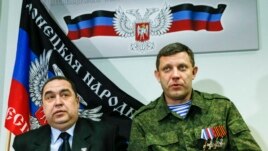18 July, 2017
Pro-Russian rebels in eastern Ukraine have announced plans to replace Ukraine with a new state.
Yet Russian officials played down the announcement. They said the rebel proposal was simply a part of public discussion.
Alexander Zakharchenko, head of the self-described Donetsk People's Republic, talked about the proposal in an appearance on Russian television. He said that rebel fighters in Donetsk, Luhansk and other areas would form a state called Malorossiya.

FILE - Alexander Zakharchenko, right, leader of the separatist-controlled area of Donetsk, and Igor Plotnitsky, leader of the separatist-controlled area of Luhansk, attend a news conference in Donetsk, Feb. 2, 2015.
In the Russian language, Malorossiya means "Little Russia." It was a term used to describe parts of modern-day Ukraine when they were part of the Russian Empire.
Zakharchenko said that the proposal is, in his words, "a peaceful way out of a difficult situation without war.
"It's our last proposal," he added.
More than 10,000 people have died in fighting since Russia-supported rebels took control of parts of Ukraine's Donetsk and Luhansk regions in April 2014. The fighting started after Russia took control of the Crimean peninsula from Ukraine.
Surprise announcement
The Associated Press reports that Zakharchenko's announcement was unexpected. It added to concerns about a 2015 ceasefire agreement that was meant to stop fighting in eastern Ukraine.
Leaders from France, Germany, Ukraine and Russia negotiated the agreement in Minsk, Belarus. Under the deal, the rebels would return control of the territories they had captured to Ukraine's central government. In exchange, the government would permit local elections and give the area the power to self-govern.
While the deal helped reduce fighting, none of the political parts of the agreement have been put in place.
On Tuesday, the Russian representative at the peace talks in Minsk dismissed the separatists' announcement. The envoy, Boris Gryzlov, said the proposal does not "fit with the Minsk process." He also said the announcement does not have "any legal consequences."
While the separatists are believed to be guided by the Russian government, they have made statements in the past that have clearly surprised Russian officials.
Zakharchenko made the announcement one day before the peace talks were to re-start in Minsk.
Ukraine's envoy at the talks, Yevhen Marchuk, said the announcement "could block the negotiations entirely."
France and Germany also condemned the proposal.
Rebel leaders in Luhansk denied that they were part of the proposal to create a new state. The Luhansk Information Center website reported that a rebel representative said they had not been informed of the plans and have "great doubts about the expediency of such a step."
Throughout the conflict, the rebel-controlled areas have been ruled by self-declared leaders in Donetsk and Luhansk.
Separatist leaders in Luhansk, unlike those in Donetsk, have generally not directly expressed plans to join Russia.
‘Puppets'
Ukrainian President Petro Poroshenko accused Russia of forcing the rebels to make the announcement. He described Zakharchenko and other rebel leaders as "puppets," whose only job is to voice "the messages they receive from Russia."
Poroshenko said Ukraine still supports the peace talks.
Volodymyr Fesenko is a political observer in Kyiv. He said that the Russian government may have influenced Tuesday's announcement. He said the government may be trying frighten the West with a possibility of Ukraine's breakup.
The Associated Press has reported on Russia's efforts to support the separatists in Ukraine with money, weapons and new fighters.
Russia, however, denies sending Russian troops to fight with the separatists.
I'm Ashley Thompson.
_______________________________________________________________
Words in This Story
play down - phrasal verb. to make (something) seem smaller or less important
empire - n. a group of countries or regions that are controlled by one ruler or one government
envoy - n. a person who is sent by one government to represent it in dealing with another government
consequence - n. something that happens as a result of a particular action or set of conditions
doubt - n. a feeling of being uncertain or unsure about something
expediency - n. the quality of being an easy and quick way to solve a problem or do something
puppet - n. a person or an organization that is controlled by another person or organization ; a doll that is moved by putting your hand inside it or by pulling strings or wires that are attached to it